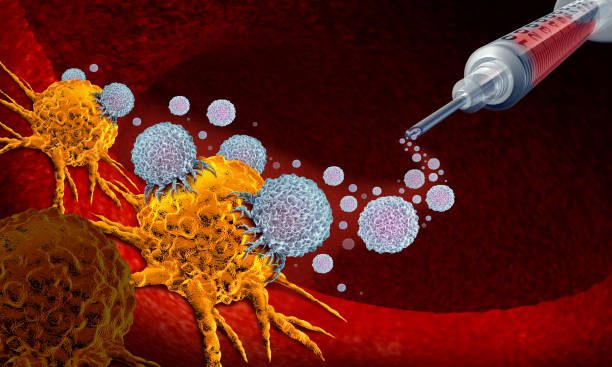
Immunotherapy in cancer treatment: Revolutionary approach in oncology
Barakat Health & Pharmaceutical Group: Cancer remains one of the most significant public health challenges globally, affecting millions of people each year. While traditional treatments such as chemotherapy, surgery, and radiation therapy have long been considered standard therapeutic options, recent advancements have introduced innovative methods like immunotherapy into the realm of cancer treatment.
Immunotherapy works by stimulating or enhancing the body’s immune system to identify and destroy cancer cells. Compared to conventional treatments, immunotherapy offers remarkable benefits, including targeted action, fewer side effects, and potentially long-term effects.
This article explores immunotherapy and its pivotal role in cancer treatment, examining various immunotherapy methods, recent advancements, challenges, and the future of these therapeutic approaches.
Immunotherapy
Immunotherapy refers to a group of treatments that assist the immune system in fighting diseases, including cancer. The immune system is naturally equipped to recognize and destroy abnormal or cancerous cells.
However, cancer cells sometimes evade this surveillance, enabling them to grow and proliferate. Immunotherapy is designed to empower the immune system to detect and eliminate these cancer cells. By harnessing the body’s immune capabilities, immunotherapy provides a promising alternative to traditional cancer treatments.
Immunotherapy Types in Cancer Treatment
- Immune Checkpoint InhibitorsThe immune system is regulated by specific checkpoints that prevent it from attacking normal cells. Some cancer cells exploit these checkpoints to avoid immune detection. Drugs that inhibit immune checkpoints, such as nivolumab and pembrolizumab, remove these barriers, allowing the immune system to target and attack cancer cells. These drugs are used in treating cancers like melanoma, lung cancer, and bladder cancer.
- Chimeric Antigen Receptor T-Cell Therapy (CAR-T)In CAR-T cell therapy, T cells from the patient’s body are extracted and genetically modified in a laboratory to recognize and attack specific cancer cells. Once genetically modified, these T cells are reintroduced into the patient’s body. This approach is particularly effective in treating hematologic cancers like leukemia and lymphoma, providing remarkable outcomes for patients with these conditions.
- Monoclonal AntibodiesMonoclonal antibodies are laboratory-engineered proteins that specifically bind to molecules on the surface of cancer cells. This binding triggers the immune system to recognize and destroy cancer cells. Monoclonal antibodies are widely used in the treatment of various cancers, including colorectal cancer, breast cancer, and hematologic cancers.
- Immunotherapy VaccinesImmunotherapy vaccines enable the immune system to respond to cancer or viruses that contribute to cancer development. The HPV vaccine (Human Papillomavirus), for example, has been a successful immunotherapy that prevents cancers related to this virus, such as cervical cancer.
Recent Advancements in Immunotherapy
- Combination TherapiesOne of the most significant developments in immunotherapy is the combination of this treatment with other therapeutic methods, such as chemotherapy and targeted therapies. Research has shown that combining immunotherapy with traditional treatments can enhance the efficacy of these therapies and result in better outcomes for some cancer types.
- Treating Resistant CancersImmunotherapy has shown promising results, particularly in treating cancers that are resistant to traditional therapies, such as lung cancer, bladder cancer, and melanoma. These treatments can lead to long-term responses and even sustained remission in some patients, offering hope where other therapies have failed.
- Application in Rare CancersImmunotherapy is also expanding into the treatment of rare cancers that previously had limited treatment options. For example, therapies are being developed to target neurological cancers or specific forms of colorectal cancer that do not respond to conventional therapies, opening new possibilities for patients with these rare conditions.
challenges & limitations
While immunotherapy holds great promise, it is not without its challenges. Some of the key challenges include:
- Lack of Response in Certain PatientsNot all patients respond to immunotherapy. Factors such as genetic characteristics of the patient and the specific type of cancer can affect the effectiveness of immunotherapy. This variability highlights the need for personalized approaches to cancer treatment.
- Side EffectsAlthough immunotherapy generally causes fewer side effects compared to chemotherapy, it can still lead to complications, such as damage to healthy tissues, inflammation, and autoimmune issues. Managing these side effects remains a critical aspect of immunotherapy treatment.
- High CostsImmunotherapy treatments are often expensive, which can limit access for many patients, especially in low- and middle-income countries. The high cost of these therapies raises concerns about affordability and accessibility.
Immunotherapy Future
Immunotherapy is continuously evolving, with researchers exploring new methods to improve its effectiveness and minimize side effects. Some potential developments for the future of immunotherapy include:
- Personalized TreatmentsAs responses to immunotherapy can vary significantly between individuals, personalized treatments tailored to the genetic and biological characteristics of each patient hold the potential to yield better results. Personalized approaches could optimize the immune response and improve treatment outcomes.
- Combination with Other TherapiesCombining immunotherapy with gene therapy, chemotherapy, or targeted therapies may enhance its effectiveness and provide better responses, especially for resistant cancers. Ongoing research in this area aims to maximize the benefits of multiple treatment modalities.
- Expansion into Various Cancer TypesIt is expected that immunotherapy will continue to expand into treating a broader range of cancers, including rare and resistant types. As more research is conducted, immunotherapy could become a cornerstone of cancer treatment for diverse and previously underserved cancer populations.
Mechanisms of Immunotherapy
Understanding the mechanisms behind immunotherapy is essential for comprehending how these treatments work and why they are effective in targeting cancer cells. Below is a more detailed explanation of the various mechanisms involved in immunotherapy:
- T Cells and Their Role in Immunotherapy: T cells, a type of white blood cell, play a pivotal role in the immune response. They recognize cancerous cells and help the immune system eliminate them. By inhibiting immune checkpoints or genetically modifying T cells, they can become more efficient at attacking cancer cells.
- Cancer Cell Recognition Systems: The immune system relies on various molecules and proteins to recognize cancer cells. One such system involves surface receptors or cancer cell antigens that can be targeted by monoclonal antibodies or T cells in immunotherapy.
Clinical Progress & Recent Studies
In addition to the scientific advancements in immunotherapy, several clinical trials and studies have shown promising results. For instance:
- Clinical Outcomes in Specific Cancers: Reviewing the clinical outcomes of immunotherapy in cancers like melanoma, lung cancer, kidney cancer, and bladder cancer can provide concrete evidence of its effectiveness in real-world settings.
- Clinical Trials and New Discoveries: Clinical trials play a crucial role in advancing immunotherapy. Highlighting ongoing studies and their results shows how quickly immunotherapy is evolving and paving the way for new cancer treatments.
Immunotherapy on Patients’ Quality of Life
One of the significant advantages of immunotherapy over chemotherapy and radiation is the improvement in the quality of life for patients:
- Reduced Side Effects: Compared to chemotherapy, immunotherapy generally causes fewer side effects, making it a more attractive option for patients who previously suffered from severe side effects.
- Long-Term Therapeutic Effects: Many immunotherapy treatments provide long-lasting therapeutic effects, which is particularly promising for patients who do not respond well to conventional therapies.
Ethical & Social Considerations
As immunotherapy becomes more widely available, several ethical and social challenges arise:
- Access to Treatment: The high cost of immunotherapy may limit its availability to patients, particularly those in low-income countries or regions with limited healthcare infrastructure.
- Informed Consent for Immunotherapy: Given the potential risks and benefits, especially with treatments like CAR-T cell therapy, informed consent is crucial to ensure that patients understand the possible outcomes of these therapies.
Immunotherapy with Other Treatment Methods
Finally, immunotherapy can be combined with other cancer treatments to maximize efficacy:
- Combination with Chemotherapy and Radiation: In some cancers, combining immunotherapy with chemotherapy or radiation therapy may result in greater effectiveness. These combinations can strengthen the immune response and reduce the tumor burden.
- Immunotherapy and Targeted Therapies: Targeted therapies that focus on specific proteins or molecular pathways in cancer cells can work synergistically with immunotherapy to improve treatment outcomes.
Conclusion
Immunotherapy has revolutionized cancer treatment, offering significant advantages over traditional therapies. While challenges remain, the future of immunotherapy is bright, with continuous advancements promising even better outcomes. By improving personalized treatments, combining therapies, and expanding applications to various cancer types, immunotherapy has the potential to transform the landscape of oncology, offering new hope to millions of cancer patients worldwide.
-
Voice of Life in World of News — Redefining Health Journalism in the Information Age

-
Senior Health Officials & Barkat GD Visit Sobhan Oncology

-
Barkat Group specialized meeting

-
Safa Appointed as Barekat General Director

-
Barekat Health & Pharmaceutical Group at the 10th Iran Pharma Exhibition

-
Ali Safa visits Sobhan Oncology & Sobhan Darou

-
Pirsalehi & Safa visit Saman Daroo 8 Knowledge-based Company

-
Barekat Managing Director Visits Samen Pharmaceutical Company

